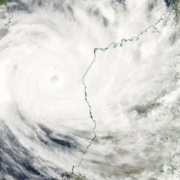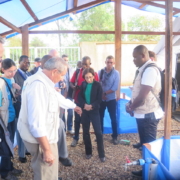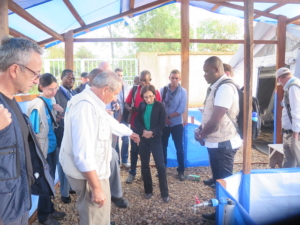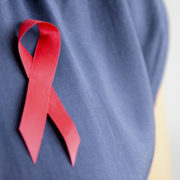Prayers for Week of 12 May
-
CCOW News
-
‘God saw that it was good’
-
Ebola
-
After the Cyclones
-
World Fair Trade Day
-
This Week’s Readings
CCOW News
These are exciting times. We’re planning a follow-up to our 2018 conference on supporting refugees, putting together proposals to network churches around Fair Trade and local environmental action, and preparing more prayer materials for the coming months.
But we need more capacity if we’re to do both ongoing and new work – and so in addition to fundraising for our normal costs, we are hoping to raise £7,000 towards a new part-time post. We’re holding a sponsored walk on Saturday, 1 June in the Windrush Valley (details here … walkers and sponsors welcome!) Pray that this will be well supported and also for funding from trusts, churches and individuals.
‘God saw that it was good’
One of the most striking moments in the recent event where Greta Thunberg spoke alongside Caroline Lucas and Anna Taylor came when a young woman spoke about politicians being “desensitised … to words like ‘mass extinction’ ‘climate change’ ‘deforestation'” and then asked: “So how do you make them understand quite how desensitised they are to words that they are throwing around?”
It’s a good question – and not just for politicians. Last Monday, the UN’s Intergovernmental Panel for Biodiversity and Ecosystem Services released its ‘Global Assessment’ (summary for policymakers here). The report’s headline points were:
- Nature’s Dangerous Decline ‘Unprecedented’
- Species Extinction Rates ‘Accelerating’
- Current global response insufficient;
- ‘Transformative changes’ needed to restore and protect nature;
- Opposition from vested interests can be overcome for public good
- Most comprehensive assessment of its kind;
- 1,000,000 species threatened with extinction
For us as human beings, a report like this could force us to acknowledge that our actions represent a threat to the entire web of life on which we depend. And for us as Christians, it could compel us to recognise that we are signally failing in our call to steward the earth and to contibute to the flourishing of what Richard Bauckham calls ‘the community of creation’. The good news is that the report also reminds us that there is still the chance to change – and to take steps that would help heal the wounds of creation!
But will the report actually have these effects? Or are we so desensitised that news like this will come and go, and we’ll keep on as we are? The report got coverage in some media outlets (eg Guardian, New York Times) – but after a day or two it was supplanted by other stories. What can we do to keep the question of earth’s survival in the public eye and to push towards the action that scientists tell us is needed?
There will be many specific issues to address: the panel’s press release mentions, among others, plastic pollution, which has increased tenfold since 1980; the dumping of “300-400 million tons of heavy metals, solvents, toxic sludge and other wastes from industrial facilities …annually into the world’s waters”; overuse of fertiliser creating marine ‘dead zones’; the impacts of overfishing and intensive farming. Each issue will demand concrete action.
But perhaps the three most crucial things we can do – from which other, practical actions will flow – are these. Firstly, to re-connect ourselves (and seek to help reconnect others) with the sense of wonder at the miracle of God’s diverse creation, so that we can truly appreciate what we are in danger of losing and can come to love it. Secondly to reject views that instrumentalise creation as a vehicle for meeting our needs, rather than as something which is precious in its own right. And thirdly to reflect on Bauckham’s idea of a ‘community of creation’, in which all created things exist to praise God … and we are invited to listen to their praise and to, as it were, join the choir.
If you have a few minutes, take the time to read Bauckham’s short sermon ‘The Community of Creation’ and reflect on it. Then ponder … what do you feel called to do to help address the current groaning of the earth? What steps could you take in your own life? How might you add your voice to advocacy by others to enable larger actions to take place? If you’d like some further inspiration, you might also want to look at Elizabeth’s powerpoint ‘God saw that it was good’.
Please pray:
- in thanksgiving to God for the majesty and diversity of creation
- offering praise to God for earth’s beauty
- asking forgiveness for our part in misusing creation’s gifts
- giving thanks for Christ’s work to redeem all things
- that humanity may come fully to appreciate the intrinsic preciousness of the whole creation
- that the UN report will inspire genuine action to preserve and protect species and ecosystems
- that God will lay on each person’s heart things that they can do to play a part in protecting the earth
Ebola
“We are life-savers — we will not be intimidated by this attack. We will strengthen our resolve, and we will fight to finish Ebola.” WHO Director General Tedros Adhanom Ghebreyesus citing comments by health workers in Nord Kivu
During April the WHO released data showing that the Merck Ebola vaccine which has been administered in North Kivu is protective over 97% of the time. This news gives hope: furnished with such an effective tool, doctors can potentially contain an outbreak.
But April was also the worst month so far for new cases in North Kivu – 406 were recorded. That single month’s number would, on its own, constitute the fourth largest Ebola outbreak on record anywhere in the world. And the start of May has been equally worrying: 139 new cases (probable and confirmed) recorded in the opening nine days – with more likely unrecorded.
The issues that continue to hamper prevention and treatment efforts are social, political and economic). Conflicts make some areas hard to reach, disrupting attempts to treat patients and trace their contacts. Many communities are angered by the priority being given to Ebola when there are so many pressing health and economic needs …and/or see local elites making money from foreign interventions, so resent public health efforts. Various people and groups have promoted unhelpful rumours and conspiracy theories about Ebola – from a denial that Ebola exists to suggestions that vaccination campaigns are in fact a way of infecting the population or that the disease itself has been introduced for political ends. “The Ebola vaccine isn’t poison” …”Ebola isn’t a tool to reduce the population density in Beni and Lubero,” a Congolese group recently tweeted, trying to counter some of the disinformation and get correct information to the public.
Given these issues, there has been not only a reluctance to engage with public health programmes, but also violence directed at health workers and health facilities. As of 3 May, there had been “since January … 119 separate attacks on Ebola response workers or operations, 42 direct attacks on health facilities, and 85 health personnel injured or killed” including Cameroonian doctor Richard Mouzoko, who was killed in Butembo in late April. Just this past week, another health worker was killed and violence closed most operations in Butembo.
This is a crucial time: two public health experts pointed out last week that the West African Ebola outbreak “really began to accelerate when daily case counts reached the numbers we are seeing now in the DRC.” It is still possible to contain the epidemic – but there needs to be more funding (the WHO has received only half its requested funds), more vaccine doses – and perhaps a new vaccination strategy – available, better security for the region, community ownership of the public health response, and greater trust among the different parties involved.
Improving the situation is possible. The UK has pledged more funds, and other donors may follow suit. A strategy to vaccinate more people, and supplies of a second vaccine, are due to be coming on stream. The DRC government and the UN mission in the Congo (MONUSCO) have offered their help with security – though there is, Tedros Adhanom Ghebreyesus acknowwledged, a balance between the need for security and the need not to seem to intimidate local communities. New strategies for testing and treatment are more integrated with general healthcare. Churches and faith groups are committed to trying to get correct information to their followers; Tearfund speaks of its partners “producing Ebola prevention songs in local languages for broadcast on the radio and for use by choirs; talks and announcements in church services; and door-to-door sharing.”
Please continue to pray (prayer points a mixture of those from CCOW and those adapted from the Congo Church Association):
- for all who have lost loved ones in the epidemic, especially children who have been left vulnerable. Pray that children who have lost parents will be taken into families and not stigmatised.
- for survivors as they seek to recover from the mental and physical trauma of the illness … and for people indirectly affected
- in thanksgiving for the courage and dedication of Congolese and foreign health workers, who are continuing their efforts despite facing personal danger. Pray for protection for them, and for them to have safe access to affected communities.
- in thanksgiving for work being done by Christian agencies and church leaders to provide correct information about Ebola and to support those affected by it. Pray that this work will be effective.
- for greater funding for WHO efforts
- for all who are seeking to build stability and trust in the region generally, and to increase trust in the Ebola response
- for those in other cities and countries who are undertaking vaccination programmes and other preventative measures to reduce the risk of a wider spread.
- for ongoing health education in schools, churches, markets, via radio programmes and posters: pray that the message would get through, and cultural practices and beliefs and fear would not hinder the prevention and treatment of Ebola.
Further Reading: CCOW has a page about the outbreak, with information, links and prayer points. It’s also worth following @HelenBranswell and @DrMikeRyan on Twitter.
After the Cyclones
“I have witnessed this pain of displacement. I have seen young children traumatised. I have heard people repeatedly say ‘It happened in the night’ and they are scared at the moment in some villages to sleep at night just in case Cyclone Idai comes again. I have seen the makeshift homes that people live in at the moment. I have seen the agricultural areas destroyed and water everywhere…So Cyclone Idai is indeed a humanitarian crisis that once again lies bare the fundamental injustice of climate change.” Archbishop Thabo Makgoba
“‘I’m trying to fix my house but I can’t afford to fix it properly. I don’t even have the money for any food for the family. I have a bag of rice from my employers, they gave it to us when they heard about the house, but that’s all we eat. We can’t buy fish like we used to. I just don’t have the money” Gomez Salgado Tome, Mozambique
The past six weeks have seen a series of devastating tropical cyclones. First was Idai, which caused catastrophic flooding in Malawi, southern Mozambique and eastern Zimbabwe. Then came Category 4 strength Kenneth, which hit northern Mozambique. Over 240,000 people were affected by its storm-caused damage, which included the partial or total destruction of over 43,000 houses. In some cases, whole villages were wiped out: in one island community, only three buildings were left standing.
Just over a week later, on 4 May, another strong Category 4 cyclone, Fani, struck in Odisha, India, cutting a destructive swathe across parts of northeast India and Bangladesh, affecting 100,000 hectares of agricultural land and uprooting more than a million trees. Despite a massive evacuation, Fani killed 64 people in Odisha State and thirteen in Bangladesh.
What happens now? While the areas affected have disappeared from the headlines, their concerns haven’t ended. With Idai and Kenneth, survivors will face for some time lack of shelter, the threat of water-borne disease, as water and sanitation facilities have been destroyed, and food insecurity, as tens of thousands of hectares of crops were ruined. Throughout Mozambique, the UN estimates that about 1.85 million people need humanitarian aid, and the World Bank has estimated the costs of rebuilding at $2 billion.
The difficulty for Mozambique, one of the world’s poorest countries, is that the government simply doesn’t have the money needed for rebuilding. The Mozambican government has, therefore, had to seek external funding. The World Bank has offered $350 million in grants to Mozambique, as well as grants for Malawi and Zimbabwe. The IMF, meanwhile, has provided $118.2 million in funds from its Rapid Credit Facility – but in the form of a loan, not a grant. This is profoundly worrying; while the loan conditions are generous (zero interest at present), Mozambique has historically been negatively impacted by its international debts. Will any new loans tip it into a cycle of debt again? The IMF itself acknowledged that most assistance to Mozambique would have to be in the form of grants “to ensure debt sustainability”.
There is a strong argument that countries like Mozambique should, in fact, receive substantial grant funding as a matter of climate justice.
Category 4 strength Kenneth was one of the strongest recorded tropical cyclones to hit mainland Africa and the furthest north to have reached hurricane-level intensity. Scientists say that the intensity of its rains and the impact of its storm surge are likely to have been increased by climate change, and the stalling that concentrated the rains may be part of a climate-related pattern.
But Mozambique’s carbon footprint per person is tiny – about 1% of the US’s or 2.5% of the UK’s by some calculations. Its people are not responsible for climate change – but they are suffering the consequences. Should they then be left to bear the costs ?
Various mechanisms exist that are helping countries with limited economic resources cope with climate impacts:
- Individual donations matter – and agencies have asked people to continue giving.
- Bilateral aid remains vital. At a time when the UK aid budget is under discussion, it’s important to emphasise the lifesaving role UK Aid has played in Mozambique, helping, among other things, to provide shelter and food to people who have lost everything.
- The World Bank has offered $350 million in grants to Mozambique, as well as grants for Malawi and Zimbabwe
But for some time, developing countries have also been pushing for funding via the ‘loss and damage’ mechanism – money which would help address climate impacts that are beyond the capacity of countries to address through adaptation. Developed countries have been nervous about the concept of ‘loss and damage’, as they fear that it would lead to their being held liable for climate-related damage and open them to claims for compensation. Instead they have favoured market-based solutions, such as increased access to insurance. But market-based solutions still often throw financial responsibility onto the people who are potentially going to suffer climate impacts – and some developing countries and environmental/development organisations are pushing for a loss and damage fund, financed perhaps by taxes on fossil fuel use or production, to which developing countries would have access.
Please pray:
- for all who continue to suffer because of the recent cyclones
- for churches, agencies, governments and all who are working to provide relief and recovery services to those affected by the three cyclones
- in thanksgiving for the UK’s commitment to giving 0.7% GNI to the aid budget. Pray for continued support for the policy and for a right use of the aid money.
- for proper funding to help developing countries recover from both slow-onset and extreme weather disasters
- for wisdom for all who are preparing negotiations around loss and damage at the next UN climate talks.
World Fair Trade Day
“I believe beautiful things are better when the people who make them are well-paid. Fairtrade has lifted quality and equality among smallholder coffee farmers in Tanzania.”
Anna Eliuze Bwambo AMCOS
“To me, fair trade means co-operating and collaborating for justice, fairness and equality for producers, farmers and handcrafters. It is about recognising and truly valuing those who produce many of the goods we enjoy and affording them the dignity and income they deserve.”
Sally Seddon, Volunteer Engagement Manager, Shared Interest
Saturday, 11 May, was World Fair Trade Day – a reminder to celebrate the work of Fair Trade Enterprises around the world. The quotes above were among those gathered by TWIN Trading, one of the oldest Fair Trade organisations in the UK, which asked the people it works with what Fair Trade means to them..
The World Fair Trade Day theme for 2019 is ‘Fair Trade Innovates’ – and the focus is on ways in which Fair Trade is innovating to find solutions to issues like inequality, climate impacts, and the need to produce goods sustainably. Find out more at the World Fair Trade Organization’s excellent new website.
Over the coming week, could you pray for the Fair Trade movement? The prayer below may be helpful – we also have many more resources on our website:
Dear Lord, we ask your blessing on all who are involved with Fairtrade, lifting before you:
- producers as they grow their crops and craft their works. Bless them, we pray, in their endeavours and grant them wisdom and discernment as they make decisions about how to use the benefits of Fairtrade.
- people who transport Fairtrade goods to market. Grant, we pray, that they, too, may be fairly treated.
- those who import and retail Fairtrade goods. Grant them, we pray, a genuine commitment to fairer trade for all.
- all of us who shop where Fairtrade goods are for sale. Grant us an understanding of the impact of our choices.
We ask all these things in the name of Jesus Christ. Amen.
Further Reading: ‘4 Ways Fair Trade is a Christian value”
This Week’s Readings
Acts 9:36-43 • Psalm 23 • Revelation 7:9-17 • John 10:22-30
“My sheep hear my voice. I know them, and they follow me. I give them eternal life, and they will never perish. No one will snatch them out of my hand. What my Father has given me is greater than all else, and no one can snatch it out of the Father’s hand. The Father and I are one.”
John 10:27 – 30
Image: Minster Lovell Hall (cropped). Credit: Hugh Llewellyn, Flickr. Used under Creative Commons License.
This email was sent to you by Christian Concern for One World.(CCOW), The Rectory, Church End, Blewbury OX11 9QH. You received it because you have asked to receive our prayer emails.
If you find our resources helpful, please consider donating to CCOW online or by cheque or standing order.




